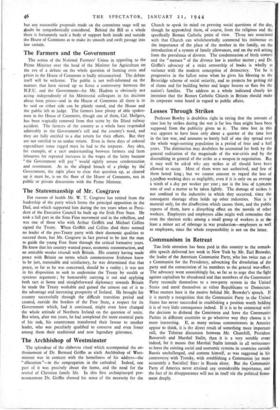Losses Through Strikes
Professor Bowley is doubtless right in saying that the amount of time lost by strikes during the war is far less than might have been supposed from the publicity given to it. The time lost in this war appears to have been only about a quarter of the time lost in the last war, and amounts to barely half of one day spread over the whole wage-earning population in a period of four and a half years. The diminution may doubtless be accounted for both by the general realisation of the magnitude of the war-crisis and by the discrediting in general of the strike as a weapon in negotiation. But it may well be asked why any strikes at all should have been allowed to occur. Most of them were not authorised, and few of them lasted long ; but we cannot consent to regard the loss of 5,500lboo working days as negligible, even if it is only on an average a ninth of a day per worker per year ; nor is the loss of 2,500,000 tons of coal a matter to be taken lightly. The damage of strikes is not confined to the industries in which they occurred, since the consequent shortage often holds up other industries. Nor is it material only, for the disaffection which causes them, and the public reports of them, have a disturbing effect on the morale of other workers. Employers and employees alike might well remember that even the shortest strike among a small group of workers is at the least a minor act of sabotage in war production—employers as well as employees, since he whole responsibility is not on the latter.


























 Previous page
Previous page